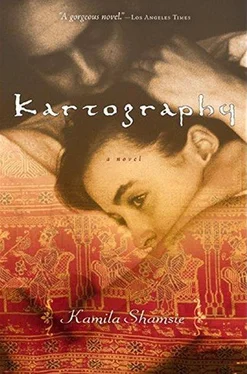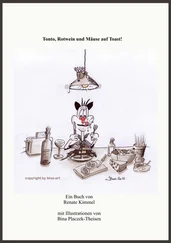His name is like cool water in my mouth.
Zia drives us back to his house. We lie on his bed together, and hold each other close, trying not to strain our ears for the sound of some infection coursing through our veins.
. . .
‘Aba, what really happened?’
For two months we had barely spoken, this question unvoiced, unanswered between us. But now he said, ‘I can’t tell you that.’ Before I could respond he held up a hand. ‘But I’ll tell you what I remember. Should we go outside?’
I led the way out of the house into the garden. It was dark, starless, and the day’s heat still hadn’t dissipated despite the welcoming sea breeze. Ami was asleep. He had brought me out here so I could raise my voice at him without waking her up.
In the garden, we stood feet away from each other, and he started to speak before my eyes had adjusted to the dark enough to see his expression.
‘Where do I begin?’ he said softly.
He wasn’t really speaking to me, but I answered all the same.
‘Start with what you were thinking, just before Shafiq walked up to your door with the telegram. Do you remember that?’
‘Oh, yes.’ I could see his expression now, but I couldn’t read it. ‘Oh, I remember that all too well. I was thinking, what if it never ends?’
‘The war?’
‘No, no. The war had ended. Had just ended. The war ended and Bunty and his friends — my friends — had beaten me up in the squash courts because I was, in their words, a Bingo lover.’
That particular insult had no place in my life. All I could think of were old English women playing some incomprehensible game in large, sterile halls.
‘I was still aching from the bruises. Aching, and thinking, what if time only exacerbates people’s wounds, intensifies their madness. I was thinking, suppose I have to leave Karachi to escape all this. And then, it happened.’
‘Shafiq knocked on the door?’
‘No. I thought it. I thought, how much easier my life would be if I wasn’t engaged.’
Oh, Aba. ‘Was that the first time…?’
‘No. No. Not by a long shot.’
He ran his hand over his face, and I looked away, biting back the words. You weak, selfish man.
‘And then Shafiq rang the bell. I opened the door. He said, “You’re going to marry one of them. You’re going to let her have your children. How?”’
He was looking off over my shoulder now, looking towards the front door as though Shafiq were standing right there, even though that house, that scene-of-the-crime from over twenty years ago, had been long ago demolished to make way for an apartment block.
‘His eyes, Raheen, they were so crazed. Crazier than Bunty’s had been when he hit me. And I saw something glinting in his hand. I thought it was a knife. It wasn’t; it was a tea-spoon, but I didn’t know that. I thought it could be a knife. And Maheen was in the house.’
This was the way out. Oh, thank you, god. Here was the reason, the explanation, the way out. I laughed with relief. ‘You knew what to say to placate him and make him leave, didn’t you? You knew if he believed you were on his side, he’d leave. Before he saw Aunty Maheen and hurt her, he’d leave. That’s all you wanted, Aba.’ I put a hand out and caught his collar. ‘We all think selfish, horrible things. We all do. But right then, you just wanted to protect her.’
His eyes left the front door and returned to me. ‘Yes, you’re right. Completely right and completely wrong. I knew what to say to make him leave. And I knew what to say to make Maheen leave me.’ He took hold of my shoulder. ‘I heard the kitchen door swing open as I stood there. I knew Maheen had walked out into the hallway, where she could hear everything.’
‘She could hear everything, yes, but you also knew that if she walked a step further, Shafiq would have seen her. You had to get him out of there, right then. That was your first concern.’ I banged his chest with my fist. ‘You thought he had a knife. Bunty, your old friend, Bunty, had beaten you up, and he hadn’t lost a brother.’
‘I could have pushed him out and slammed the door and locked it.’
‘You don’t push men with knives, Aba. You talk them down. You placate them.’
‘I could have said, actually we’ve just broken our engagement. Let’s go to your place and I’ll tell you all about it.’
‘He would have guessed you were lying. You had to say something shocking enough that he wouldn’t see it as a lie…’
‘I couldn’t leave Maheen. Just after the war, how could I bring myself to leave her with everything going on. But if she left me, if I said something completely unforgivable…”
‘You wanted to save her.’
‘I wanted to save myself.’
‘You can’t be sure of that.’ We both said that, at exactly the same instant, and both fell silent.
‘That look in her eyes, Raheen,’ he said eventually. ‘When I turned to look at her, just after I said what I said. I would have given up anything — my city, my friends, my life — to erase that look from her eyes. It’s when I knew I still loved her, beyond everything else. But when I opened my mouth to explain, I didn’t know. I didn’t know why I had said it. Right then two entirely divergent explanations asserted themselves with equal force in my brain. Both, Raheen, seemed possible. Perhaps that was crime enough: that both seemed possible.’ He sounded unutterably weary. ‘Which isn’t to say it doesn’t matter. The truth matters, of course. Was I the protector or the coward? I don’t know.’ He pulled himself up straight. ‘I’ll never know.’
Without waiting for a response, he walked past me, back to the house. As I watched him go, I knew I wasn’t watching either the father I adored or the father who had betrayed me with his own weakness, but a middle-aged man who had revealed to me the terror and the pity that I might still just be able to avoid.
. . .
There are two ways to escape suffering [the inferno where we live every day]. The first is easy for many: accept the inferno and become such a part of it that you can no longer see it. The second is risky and demands constant vigilance and apprehension: seek and learn to recognize who and what, in the midst of the inferno, are not inferno, then make them endure, give them space.
— Italo Calvino
Karim,
There’s a street in Karachi that follows the moon.
Near an Imam Baragh, there’s a line of houses, with hack and front doors and no boundary walls. When the lunar calendar enters the month of Muhurram, Shia women make their way to the Imam Baragh daily. There is a back door to the Imam Baragh for them, for the ones in purdah, and to reach that back door without being gazed upon by strangers in the open streets they walk through the neighbourhood houses. Back and front doors are flung open, and the women walk through from the hallway of one house to the hallway of another until that alley within houses takes them all the way to the door of the Imam Baragh. It is an alley without name, it is an alley that ceases to exist when the moon disappears, but it is an alley all the same and one that says more about Karachi than anything you’llfind on a street map.
Your mother called the other day to say she’s given you a copy of my father’s letter. In it he speaks of Karachi’s war stories that are personal in a way which excludes everything outside the story. I
understand now, at last, what this has to do with street names. I’ve always thought it wonderful that everyone I know in Karachi gives directions in terms of landmarks and stories — go to the submarine roundabout; turn into the lane where the car thief accosted Zia; drive until you come to Soma’s father’s office. Such familiarity, such belonging, wrapped up in every set of directions. Don’t deny there’s something remarkable about that; we belong to a city invested in storytelling. It is in our blood. But you can only be familiar with those you know well, you can only know the stories of those to whom you’ve bothered to listen. What happens to all those streets that hold no stories for us? Do we simply stay away from them? I’ve lived my life in such limited circles and it’s your voice I hear now, telling me the limited can be so limiting.
Читать дальше












